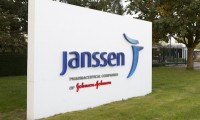-
Janssen shares positive phase 3 results for erdafitinib in bladder cancer
- Source: drugdu
- 114
- June 10, 2023
-
New study shows certain blood pressure drugs could boost the efficacy of cancer immunotherapy
- Source: drugdu
- 140
- June 9, 2023
-
Amgen’s Lumakras shows promise in phase 3 lung cancer study
- Source: drugdu
- 145
- June 8, 2023
-
Johnson & Johnson’s Balversa tops chemotherapy in bladder cancer trial
- Source: drugdu
- 168
- June 7, 2023
-
AstraZeneca shares positive phase 3 results for Tagrisso in lung cancer
- Source: drugdu
- 198
- June 7, 2023
-
Moderna and Merck cancer vaccine used with Keytruda reduces risk of deadly skin cancer spreading
- Source: drugdu
- 123
- June 7, 2023
-
Study shows efficacy and safety of novel FolRα-targeting antibody drug conjugate in recurrent epithelial ovarian cancer
- Source: drugdu
- 161
- June 6, 2023
-
Dana-Farber research supports FDA approval of new therapy for metastatic breast cancer
- Source: drugdu
- 146
- June 6, 2023
-
FDA allows temporary import of unapproved Chinese cancer drug to ease U.S. shortage
- Source: drugdu
- 129
- June 6, 2023
-
Multi-cancer blood test shows real promise in NHS study
- Source: drugdu
- 119
- June 5, 2023
your submission has already been received.
OK
Subscribe
Please enter a valid Email address!
Submit
The most relevant industry news & insight will be sent to you every two weeks.













